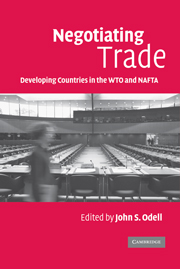Book contents
- Frontmatter
- Contents
- List of figures
- List of tables
- List of contributors
- Acknowledgments
- 1 Introduction
- Part I Multilateral negotiations
- 2 The evolution of national interests: new issues and North–South negotiations during the Uruguay Round
- 3 Reframing the issue: the WTO coalition on intellectual property and public health, 2001
- 4 The strict distributive strategy for a bargaining coalition: the Like Minded Group in the World Trade Organization, 1998–2001
- 5 Learning in multilateral trade negotiations: some results from simulation for developing countries
- Part II Regional negotiations
- Part III WTO Dispute Settlement Negotiations
- Index
4 - The strict distributive strategy for a bargaining coalition: the Like Minded Group in the World Trade Organization, 1998–2001
Published online by Cambridge University Press: 22 September 2009
- Frontmatter
- Contents
- List of figures
- List of tables
- List of contributors
- Acknowledgments
- 1 Introduction
- Part I Multilateral negotiations
- 2 The evolution of national interests: new issues and North–South negotiations during the Uruguay Round
- 3 Reframing the issue: the WTO coalition on intellectual property and public health, 2001
- 4 The strict distributive strategy for a bargaining coalition: the Like Minded Group in the World Trade Organization, 1998–2001
- 5 Learning in multilateral trade negotiations: some results from simulation for developing countries
- Part II Regional negotiations
- Part III WTO Dispute Settlement Negotiations
- Index
Summary
Developing country delegates in multilateral trade negotiations have become quite active in forming bargaining coalitions. But there has been little research concerning how this has been done, what the results have been, or what influences these results. In tackling these questions, this chapter identifies strategy choices made by weak-state coalitions as possible influences on their outcomes, the outcome being the primary dependent variable.
Our method is to learn more about the multilateral negotiation process through a single case study and attempt to generate a potential generalization for further investigation in other cases. The Like Minded Group of countries (LMG) in the World Trade Organization illustrated what we call the strict distributive strategy in WTO negotiations from 1998 through the November 2001 ministerial conference in Doha, Qatar. This coalition put forward a number of detailed proposals that would have shifted value from North to South and denied any negotiating gain to the North until the North had first granted the group's demands. Despite a great deal of organized professional effort in Geneva, however, the group had by the time of the Doha conference, as we read the record, sustained a major loss and collected relatively small gains especially on their leading issue compared with the status quo. The LMG did play a leading role in delaying what they regarded as another serious loss. But this coalition gained less at Doha than others such as the coalition concerned with TRIPS and public health, which used the mixed-distributive strategy, as shown chaper 3.
- Type
- Chapter
- Information
- Negotiating TradeDeveloping Countries in the WTO and NAFTA, pp. 115 - 144Publisher: Cambridge University PressPrint publication year: 2006
- 16
- Cited by



